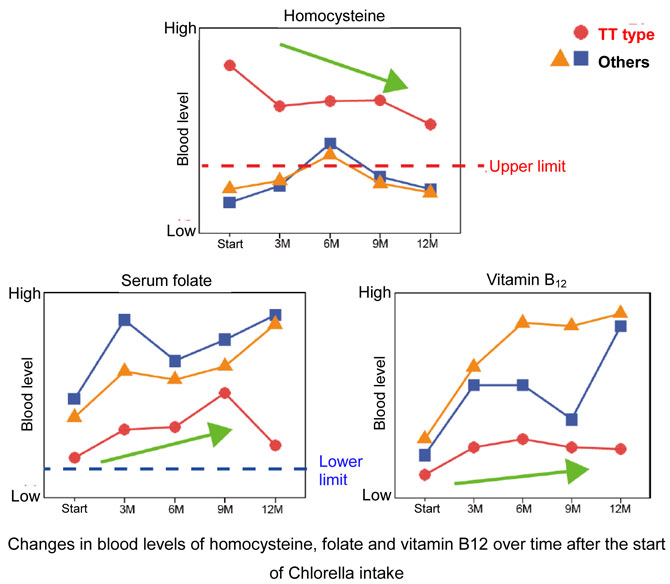- TOP
- List of reports
- Evaluation Based on "Individual Person's Characteristics" -- Chlorella Expected
to Enhance Folic Acid's Benefits!
Evaluation Based on "Individual Person's Characteristics" -- Chlorella Expected to Enhance Folic Acid's Benefits!
【Scientific information】
Research and Development Department, Sun Chlorella Corporation
Evaluation Based on "Individual Person's Characteristics"
-- Chlorella Expectedto Enhance Folic Acid's Benefits!
Presented at the 53rd Kinki Branch Meeting of the Japan Society of Nutrition and Food Science
- Objectives
- Health guidance is often designed to help improve lifestyle-related diseases and prevent illnesses through advising review of dietary style, practice of exercise during daily life and so on. Nowadays, everyone can receive a genetic test simply by providing a sample of saliva or oral mucosa, and obtain information about "individual person's characteristics" such as nutrient utilization rate and risk for illnesses. Recently, a new approach to health guidance has begun to be discussed, involving the attempt of improving the lifestyle of individuals in line with the "individual person's characteristics." As one such effort, a study has been carried out on utilization rate of folate (a substance which is associated with the risk for onset of cardiovascular diseases and newborn's spina bifida) in the body and "individual person's characteristics" related to the MTHFR gene C677T. It has been reported that this gene is TT type (associated with low folate utilization rate) in about 16.7% of all Japanese and folate cannot be sufficiently taken through ordinary meals alone. For efficient utilization of folate in the body, vitamin B12 and B6 are needed. Chlorella is known as a food rich in folate and vitamin B12 and B6. Therefore, analysis of changes in the body following intake of Chlorella in connection with "individual person's characteristics" is important from the viewpoint of preventive healthcare and may lead to proposal of a new concept of health guidance. The present study was undertaken under such a background.
- Methods
- The study involved 3 healthy men. Each subject took Chlorella twice daily in the morning and evening, 4 g each time, for one year. MTHFR gene test was conducted and blood levels of serum folate, vitamin B12, homocysteine, etc. were measured every 3rd month.
- Results
- MTHFR gene test revealed that the gene was TT type (associated with low serum folate utilization rate) in one subject. As reported before, the subject with this gene type study-report Sun Chlorella Research Site http://lab-sunchlorella.com/ was low in serum folate level and high in blood homocysteine level during ordinary life. Furthermore, blood vitamin B12 level was also low in this subject, suggesting that the utilization rate in this subject was also low on vitamins other than serum folate. However, after one year of Chlorella intake, this subject showed elevation in serum folate and vitamin B12 levels and marked reduction in blood homocysteine level. Generally speaking, the folate contained in food is poorly utilized in the body compared with the synthetic folate contained in food supplements. However, the elevation of serum folate following Chlorella intake in this subject suggests the possibility that Chlorella may have actions which cannot be explained by conventional views.

Details
- Conference:
- The 53rd Kinki Branch Meeting of the Japan Society of Nutrition and Food Science
- Title:
- Effects of Long-Term Chlorella Intake on Men – Findings from MTHFR Gene Polymorphism and Thorough Gene Expression Analysis –
- Authors:
- Masaki Fujishima1), Masato Onishi1), Michie Kobayashi2), Seiji Nakamura2) and Hideo Takekoshi1)
- Affiliation:
- 1) Sun Chlorella Corp., 2) DNA Chip Research Inc.





